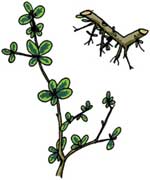| Home A B C D E F G H I J K L M N O P Q R S T U V W X Y Z |
|
Home |
GuggulTree Bark May Solve Your High
|
|||

You must be kidding. Tree bark? This may sound a little outrageous, but the reality is, it's true. Over the last 200 years the bark of a unique tree, found in India and Arabia, has been used by health practitioners to treat heart ailments and more recently to lower LDL cholesterol. The resin from the bark of this unique tree is now commonly used in Western countries in naturally formulated supplements aimed at reducing high cholesterol levels, a major concern of more than 50 million Americans.
The myrrh tree is a small thorny tree, which grows about 5 feet tall, and is native to both Arabia and India. The bark of this tree produces a resin commonly known as guggul.
Guggul exhibits a rather amazing cholesterol lowering ability unlike any other natural substance. Numerous studies have shown that guggul significantly lowers triglycerides and cholesterol as well as LDL cholesterol (bad cholesterol). In human trials, using gugulipid, cholesterol levels dropped 14 to 27 percent in a 12-week study period while the triglyceride levels dropped from 22 to 30 percent. These results were produced with no significant change in exercise levels or diet.
Many naturopaths and holistic health practitioners regularly recommend guggul as it has a positive effect in preventing heart arteriosclerosis, or narrowing of the arteries along with its cholesterol lowering properties. In fact, some doctors now believe that the herb actually improves cardiac muscle functioning and improves the pumping activity of the heart.
Today more and more Americans are turning toward natural cholesterol lowering supplements as a reliable alternative to the frequently prescribed prescription statin drugs which, while effective, often are accompanied by undesirable side effects including muscle cramps, upset stomach, headache and fatigue.
The choices and approaches for treating dangerous high cholesterol levels are many and anyone considering supplements or any other natural treatment for high cholesterol should consult with their physician and follow his guidance.
About The Author
Frank Darling publishes The Healthy Choice Journal, a bi-weekly natural health newsletter. Visit http://www.healthychoicenaturals.com for more information.
| When selecting a product, look for one clearly marked as a gugulipid supplement and not guggul or guggulu — crude and unrefined forms of the resin that could easily contain toxic compounds. A dangerous loss of appetite, stomach pain, diarrhea, and rashes could develop from guggul or guggulu. Gugulipid, on the other hand, has been refined to contain only the active ingredients without the toxins. In rare cases, however, even gugulipid may cause side effects such as mild nausea, gas, diarrhea, hiccups, restlessness, anxiety, or headaches. |
|
Glossary References Links Contact
|